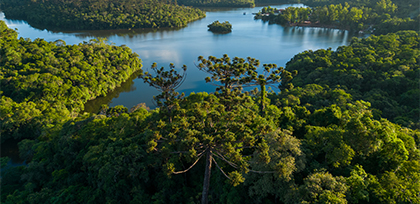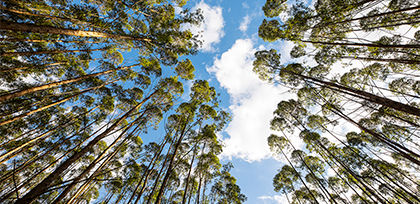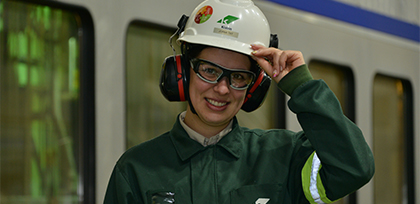Sustainable Economy
Growth and value creation
The 2022 results demonstrate Klabin's capacity to expand and create value in a variety of contexts. The integrated and flexible business model, with a wide range of products, has enabled the Company to pursue its investment strategy and its growth trajectory.
The 13th consecutive year of growth in Adjusted EBITDA, reaching a level of BRL 7.8 billion, excluding non-recurring effects, and the prudent allocation of capital enabled the generation of cash in the period and, consequently, the creation of value for shareholders. The Return on Invested Capital (ROIC) was 19.2% in 2022, a level that has been sustained for multiple quarters.
Financial result
BRL 7.8
billion in Adjusted EBITDA, excluding non-recurring effects, up 13% from 2021.
19.2%
ROIC, signaling consistent performance across multiple quarters and assertive capital allocation.
2.6x
was the net debt/adjusted EBITDA ratio measured in dollars, demonstrating the Company's deleveraging, even during the Puma II investment cycle.
Operating results
-
Sales volume (excluding wood) was 3,852 thousand tons, 1% higher than the amount seen in 2021.
-
Eukaliner's® incremental volume from MP27 contributed to the result, offsetting the volume downturn observed in other segments.
-
Net revenue reached BRL 20.033 billion, a 22% increase from 2021, with growth across all business segments: pulp, paper, and packaging.
What challenged Klabin
The unit cash cost, which encompasses the sale of all the Company's products and includes selling, general and administrative expenses, excluding the effects of scheduled stoppages, was BRL 3,111 per ton. This amount represents an increase of 24% compared to 2021. This growth is primarily attributed to the rise in chemical and fuel costs, inflation of services and labor, and the reduced absorption of fixed costs due to the decreased sales volume. There was also an increase in the cost of fibers due to increased purchases of wood from third parties to meet the demands of the first cycle of the Puma II Project, while the company's own forests are being developed for harvesting in the second cycle.
Part of this increase was offset by the decrease in average cost and lower purchase volume of chips resulting from the reduced production of recycled materials, as well as the decreased purchase of paper from external sources, both due to the increased integration of kraftliner in the production of corrugated board boxes.
Business unit contributions
The Forestry Unit has taken action to address the increased production volumes resulting from the Company's capacity increases. By the end of 2022, approximately 90% of the forest expansion program had been finished. The performance achieved was challenging, with Paper Machine 27 operating at full capacity and necessitating the implementation of the forest area plan that had been devised since the inception of Puma II.
In this scenario, approximately 16 million tons of pine and eucalyptus logs and wood chips were transported. Most of it was used for the production of paper and pulp, and the biomass resulting from the processing of this wood was used for self-generation of energy by the Company. Of this total, the volume of log sales to third parties was 1 million tons, with net revenue of BRL 192 million in 2022.
The Pulp Business operated beyond its nominal capacity, the result of debottlenecking initiatives combined with increased manufacturing productivity. The production volume reached 1,586 thousand tons, down 4% from the volume of the previous year, as there was no general maintenance stoppage in 2021. Net revenue reached BRL 6.995 billion, up 21% from 2021, and operating cash flow, measured by EBITDA, was BRL 3,964 billion in the year, 8% higher than the previous year, the best result since the Puma Unit in Paraná began operations in 2016.
Fluff pulp showed resilient demand, superior to that of other fibers, solidifying the positive outlook for the Company's future. In the softwood pulp market, Klabin sustained its important regional leadership. Hardwood, on the other hand, accounted for 30% of the financial result in 2022
The accelerated structural changes brought on by the Covid-19 pandemic, the increased demand for more sustainable products, the shift from single-use plastic to paper packaging, and the greater presence of e-commerce in sales were all made more evident in 2022, resulting in strong performance from the Paper business unit.
As it already operates at its maximum capacity for card production, sales volume remained steady when comparing the years 2022 and 2021, despite the high demand for this market in 2022. Paperboard sales revenue totaled BRL 3,538 billion, up 15% compared to 2021, due to the implementation of price adjustments throughout the year, which offset the negative impact of foreign exchange during the period. The unit also solidified the sales of Paper Machine 28's card production, formalizing contracts for approximately 60% of its total sales volume. MP28 will come online in the second quarter of 2023.
The kraftliner market started the year 2022 with high price levels, close to all-time highs, after a year of strong growth. In the first six months, new price hikes were driven by cost pressures from producers in the Northern Hemisphere, primarily due to the energy matrix in Europe. In the second half of the year, however, the decrease in demand, the increase in supply, and the higher level of customer inventories due to improved logistics initiated the price correction. In this context, Klabin leveraged its ability to incorporate paper into packaging, reducing the production of recycled paper and increasing the conversion of kraftliner, more competitive, into corrugated board.
The sales volume of containerboard was 568,000 tons, a 35% increase from the 2021 volume, primarily due to the increased volume of Eukaliner® from MP27. Net revenue reached BRL 2,820 billion, a 75% year-on-year increase, due to the combination of increased volume sold and price adjustments that counteracted the negative impact of foreign exchange during the period.
Due to factors such as the deceleration of consumer goods and the decrease in the tobacco and fruit harvest caused by climate and market-related issues, particularly in Europe, sectors in which Klabin has a significant presence, the Company's corrugated packaging sales volume dropped 8% compared to 2021, totaling 876,000 tons. Net revenue, in turn, was BRL 4,973 billion in the year, an increase of 7% compared to the previous period, reflecting price transfers throughout the year to compensate for cost inflation.
The Industrial Bags business continued to operate at full capacity, propelled by the increasing demand for sustainable packaging, particularly the substitution of single-use plastic.
In 2022, there was a 4% decrease in sales volume compared to 2021, due to the change in the product portfolio, with an increased volume of bags for new applications, such as animal feed, sugar, coffee, and flour. These, being smaller and lighter than bags for civil construction, they take up less volume when measured in tons, but have a higher added value. As a result, net revenue reached BRL 1,217 billion in 2022, a 17% increase due to a better mix of sales and price transfers to offset the cost inflation during the period.















